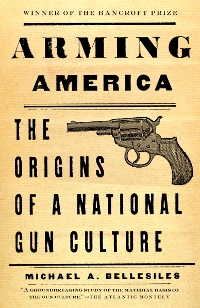Arming America: The Origins of a National Gun Culture
 |
|
| Author | Michael A. Bellesiles |
|---|---|
| Country | United States |
| Genre | History |
| Publisher | Alfred A. Knopf |
|
Publication date
|
2000 |
| Pages | 603 |
| ISBN | |
| OCLC | 00106191 |
| 683.4/00973 21 | |
| LC Class | HV8059.B395 2000 |
Arming America: The Origins of a National Gun Culture is a discredited 2000 book by historian Michael A. Bellesiles about American gun culture, an expansion of a 1996 article he published in the Journal of American History. Belleisles, then a professor at Emory University, used fabricated research to argue that during the early period of US history, guns were uncommon during peacetime and that a culture of gun ownership did not arise until the mid-nineteenth century.
Although the book was initially awarded the prestigious Bancroft Prize, it later became the first work for which the prize was rescinded following a decision of Columbia University's Board of Trustees that Bellesiles had "violated basic norms of scholarship and the high standards expected of Bancroft Prize winners."
The thesis of Arming America is that gun culture in the United States did not have roots in the colonial and early national period but arose during the 1850s and 1860s. The book argues that guns were uncommon during peacetime in the United States during the colonial, early national, and antebellum periods, that guns were seldom used then and that the average American's proficiency in use of firearms was poor. Bellesiles maintains that more widespread use and ownership of guns dated to the Civil War, a period of widespread advance in firearm manufacturing and a consequent reduction in price and improvement in accuracy.
The book garnered many enthusiastic professional reviews and won the prestigious Bancroft Prize in 2001. The book's thesis bore upon ongoing political controversies about gun control and the Second Amendment to the United States Constitution and gun rights advocates criticized it. Actor Charlton Heston, then-president of the National Rifle Association, described the book's argument as "ludicrous".
...
Wikipedia
